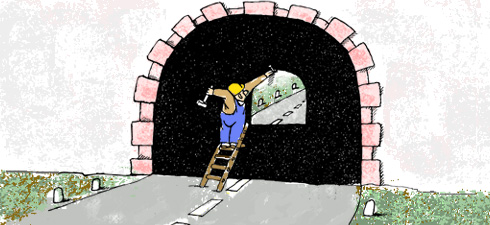Have you ever heard the expression a "Potemkin Village"? It is a Russian expression and derives from a large and extremely successful scam played by Marshall Potemkin -- one of Catherine the Great's many lovers. In the late 18th century, the Russian elite was keen to pretend to the world that it was more powerful and more muscular than it actually was. As result, the court in St Petersburg decided to take foreign dignitaries and ambassadors down the River Dnieper to witness just how thankful the peasants of the newly occupied Ukraine were to their new, benign Russian overlords.
Knowing that the Westerners -- the dignitaries were British, French and Prussian -- wouldn't expect a hoax, Potemkin constructed mobile villages, which he assembled at the turns of the river just before the royal barges carrying the foreigners came into view. What the foreigners would see on the riverbanks were excited, grateful peasants cheering on the royal Russian barges and showering Catherine the Great with compliments. When the barge went out of view, Potemkin would uproot the "village" and transport it, by night, further down the river to assemble it again ahead of the same royal barges when the barges continued down the river having docked overnight.
The foreigners went home marvelling at the strength and wisdom of the Russians, evidenced by the fact that even those whom the Russians conquered were fawning in their praise of their new masters such was the decency of the Russian occupation.
But the key to understanding the gullibility and the success of the Potemkin villages is that the foreigners wanted to believe, because they needed a success in Russia. It was 1787 after all. Monarchist America had become a republic and imperial France was teetering. Old certainties were crumbling for the old order. There was a feeling that a powerful monarchist Russia was needed in order to stop the "domino effect" of the Enlightenment, American Republicanism and war in Europe. In the event, George Washington and Maxim Robespierre put paid to their false hopes -- the dominoes did topple.
Given the fear of revolutionary contagion, it's easy to see why the dignitaries were predisposed to gullibility -- because they didn't want to face up to the consequences of what was actually happening on the ground. They wanted to see the world as they wanted it to be, not as it actually was. And if that meant believing in mobile villages, then so be it! Read full article in the Irish Independent...
Was this article useful? If so we are delighted!
It is freely available because we believe that the right to free and independent information is essential for democracy. But this right is not guaranteed forever, and independence comes at a cost. We need your support in order to continue publishing independent, multilingual news for all Europeans.
Discover our subscription offers and their exclusive benefits and become a member of our community now!












